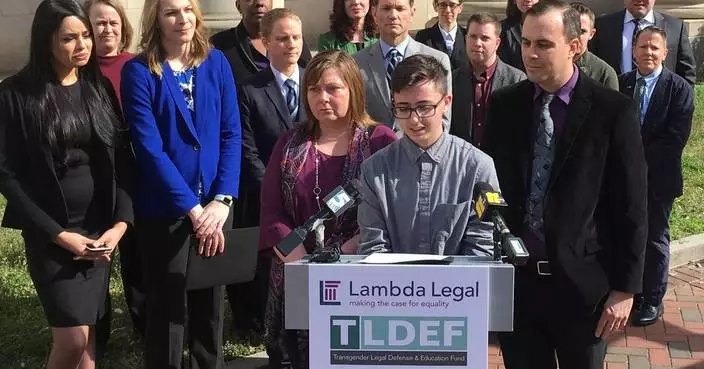BANGKOK (AP) — Guerrilla fighters from Myanmar’s Karen ethnic minority claimed Monday to be close to seizing control of a major trading town bordering Thailand, as soldiers and civil servants loyal to the military government appeared to be preparing to abandon their positions.
The occupation of Myawaddy town by the Karen National Liberation Army, the armed wing of the Karen National Union, or KNU, appeared imminent as the guerrillas seized or besieged strategic army outposts on the town’s outskirts, a spokesperson and members of the KNU said Monday.
Myawaddy, in Kayin state, is Myanmar’s most active trading post with Thailand, and its fall would be the latest in a series of shock defeats suffered by the army since last October, when an alliance of three other ethnic rebel groups launched an offensive in the country’s northeast. Over the past five months, the army has been routed in northern Shan state, where it conceded control of several border crossings, in Rakhine state in the west, and is under growing attack elsewhere.
The military government under Senior Gen. Min Aung Hlaing has acknowledged it is under pressure, and recently introduced conscription to boost its ranks.
The nationwide conflict in Myanmar began after the army ousted the elected government of Aung San Suu Kyi in February 2021 and suppressed widespread nonviolent protests that sought a return to democratic rule.
Three residents of Myawaddy town, who spoke on the condition of anonymity because they fear being arrested by either warring side, told The Associated Press by phone that they had heard no sounds of the fighting outside since Sunday afternoon. They said most residents were working as usual, while others were preparing to flee to Mae Sot, just across the border in Thailand. Two of them said they had not seen any members of the government’s security forces since Sunday.
The situation was highlighted Sunday night when a Myanmar plane made an unscheduled flight to Mae Sot from Yangon, Myanmar’s biggest city. Thai media reported that the plane had received permission from Thai authorities to evacuate people fleeing Myawaddy. It was not clear if those fleeing, described as military and civil servants loyal to Myanmar's military government, had already crossed into Thailand over the river that marks the border.
Thailand’s Foreign Ministry on Monday confirmed that approval was given for three flights on a Yangon-Mae Sot route to transport passengers and cargo, one each day on Sunday through Tuesday. Myanmar’s government later canceled its requests for the remaining two flights.
The Thai government was closely monitoring the situation along the border, and is ready to take all necessary measures to maintain peace and order, and to keep the people along the border safe, the Thai ministry said.
In times of fighting along the frontier, Thailand has generally granted temporary shelter to Myanmar villagers. There are also about 87,000 living in nine long-term refugee camps.
The KNU, which is the leading political body for the Karen minority, said in a statement posted on Facebook that its armed wing and allied pro-democracy forces on Friday had seized the army base on the road to Myawaddy at Thin Gan Nyi Naung. It had served for nearly six decades as the military’s regional headquarters.
It said that 617 members of the security forces and their family members had surrendered. The KNU posted photos of the weapons that it claimed to have seized and captured military personnel and their family members given shelter in a school.
Two Karen guerrillas involved in their group’s offensive told AP on Monday that they have surrounded an army garrison about 4 kilometers (3 miles) to the west of Myawaddy that is in charge of the town’s security, and an artillery battalion to the south. Negotiations were underway for their surrenders, they said, speaking on condition of anonymity because they are not authorized to release information.
They also said the Karen have control of about 60% to 70% of Myawaddy township, and are almost certain to capture the town itself after the two bases surrender or are overrun.
The Karen, like other minority groups living in border regions, have struggled for decades for greater autonomy from Myanmar’s central government.
Fighting between the army and Karen armed groups intensified after the military seized power in 2021. Several ethnic rebel groups including the Karen have loose alliances with pro-democracy militias after the military takeover, and also offer refuge to the civilian opponents of the military government.
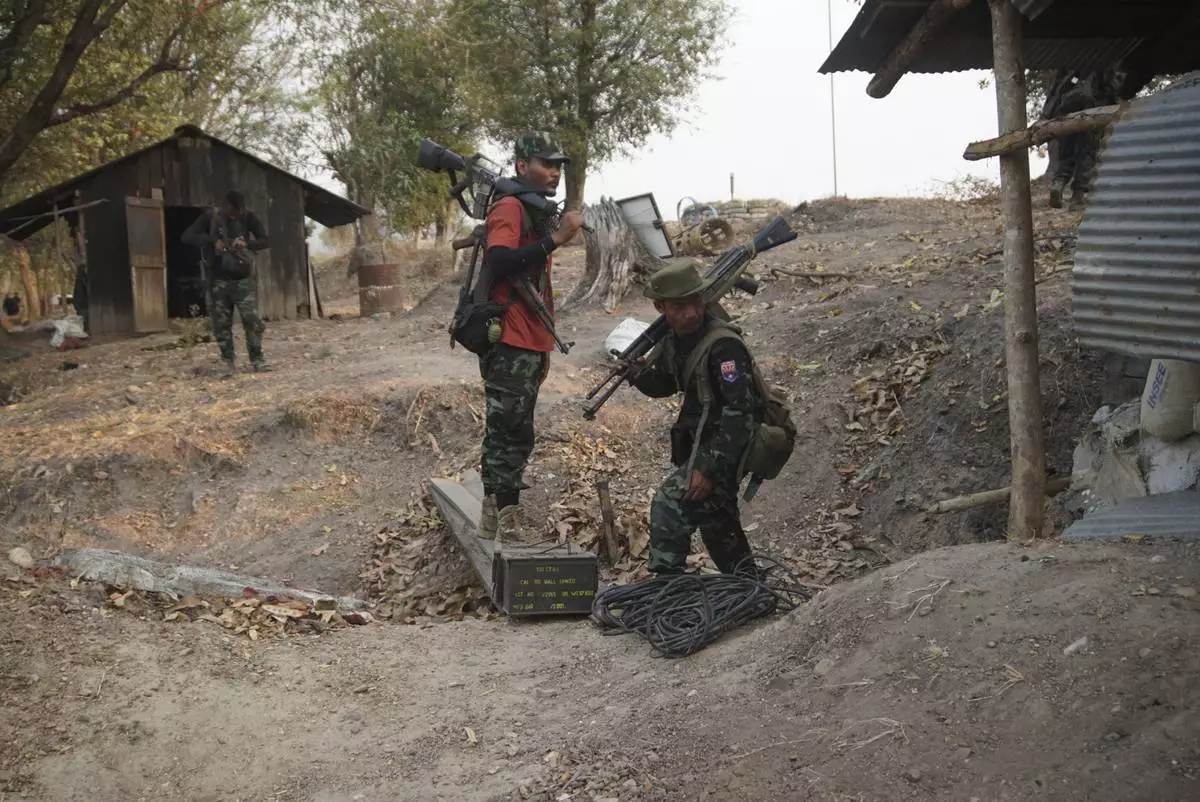
Members of the Karen National Liberation Army and People’s Defense Force collect weapons after they captured an army outpost, in the southern part of Myawaddy township in Kayin state, Myanmar, March 11, 2024. (AP Photo/METRO)
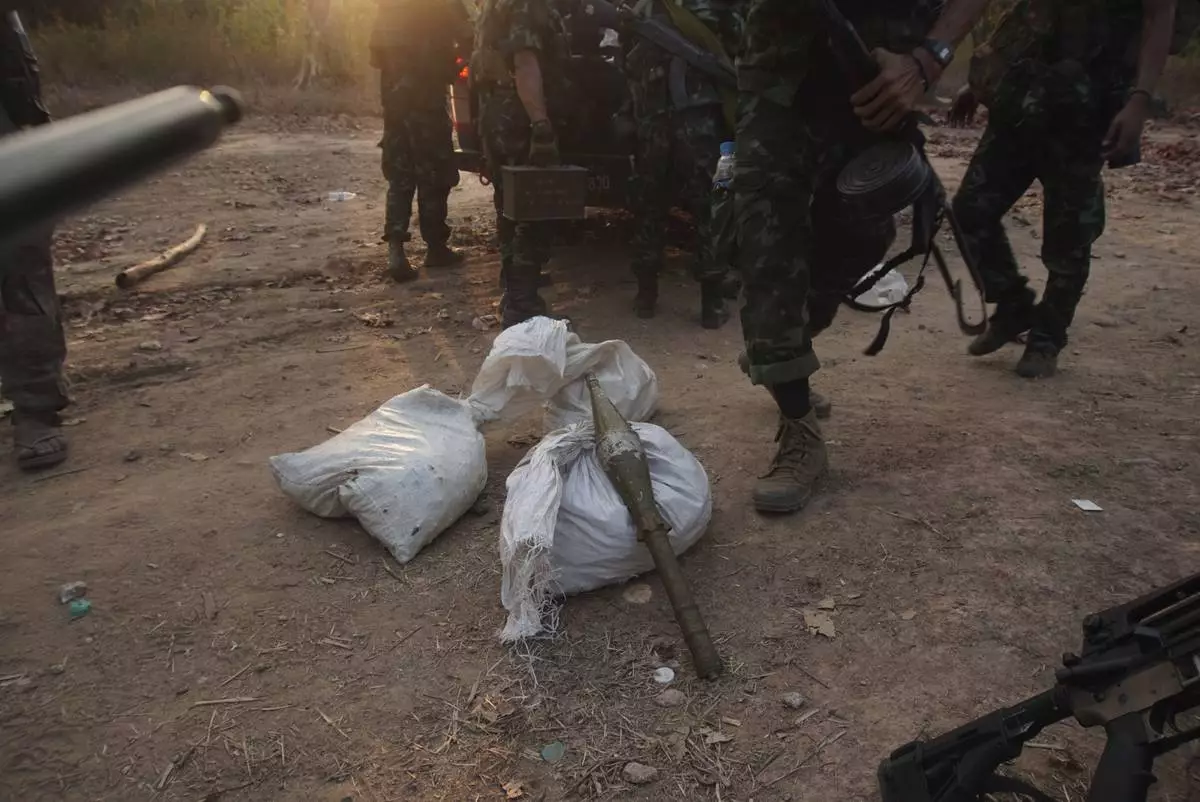
Members of the Karen National Liberation Army and People’s Defense Force collect weapons after they captured an army outpost, in the southern part of Myawaddy township in Kayin state, Myanmar, March 11, 2024. (AP Photo/METRO)
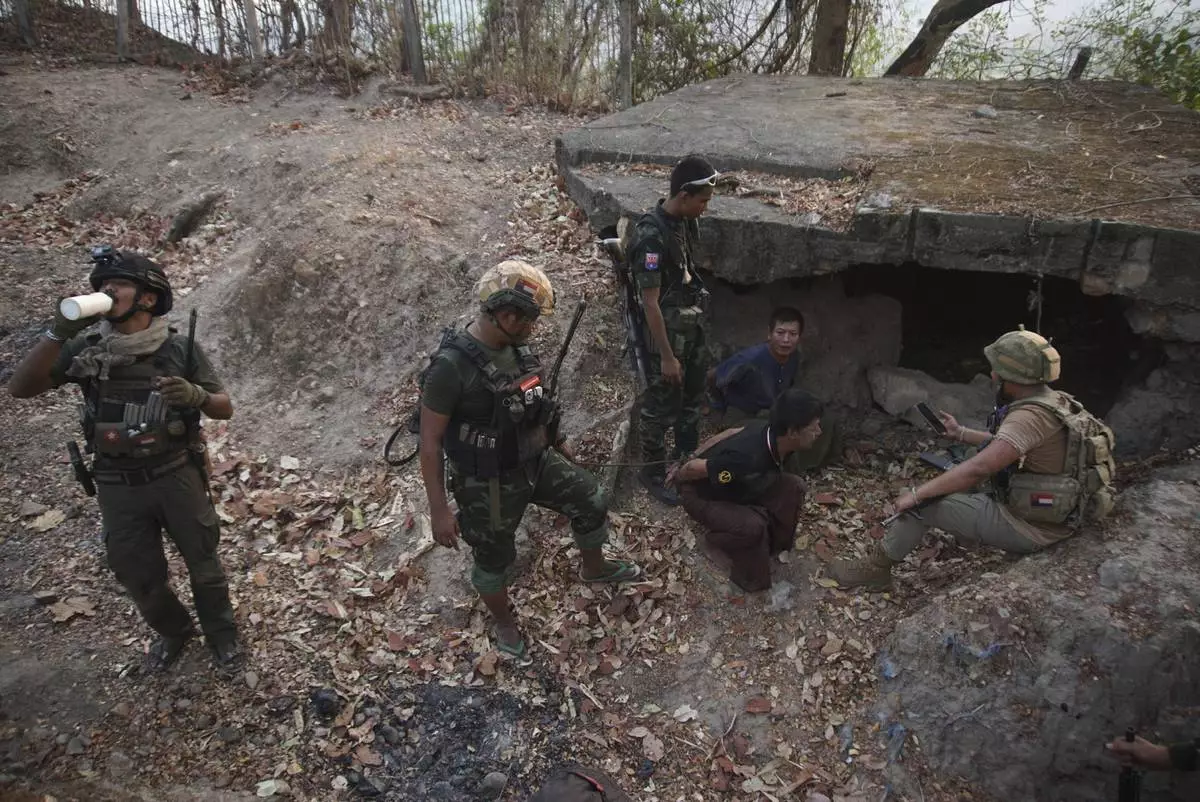
Members of the Karen National Liberation Army and People’s Defense Force examine two arrested soldiers after they captured an army outpost, in the southern part of Myawaddy township in Kayin state, Myanmar, March 11, 2024. (AP Photo/METRO)
TOPEKA, Kan. (AP) — Republican legislators moved Monday to enact a ban in Kansas on gender-affirming care for minors and bar state employees from advocating social transitioning for transgender youth, brushing aside criticism that they were hurting the state's image.
The GOP-supermajority Kansas House expected to vote on overriding Democratic Gov. Laura Kelly's veto only hours after the Senate did on a 27-13 vote, exactly the required two-thirds margin. The vote in the House was expected to be close after LGBTQ+ rights advocates raised questions about whether the provision against promoting social transitioning is written broadly enough to apply to public school teachers who show empathy for transgender students.
Under the bill, social transitioning includes “the changing of an individual’s preferred pronouns or manner of dress,” and the rule would apply to state workers who care for children. The measure doesn’t spell out what constitutes promoting it.
The bill is part of a broader push to roll back transgender rights from Republican lawmakers in statehouses across the U.S. Kansas would be the 25th state to restrict or ban such care for minors, and this week the South Carolina Senate expected to debate a similar measure that already has passed the state House.
“Unfortunately, in today’s society, the predator in particular is a woke health care system,” said Republican state Sen. Mark Steffen, a central Kansas anesthesiologist and pain management specialist.
Like other Republicans across the U.S., Steffen and other GOP lawmakers in Kansas argued that they're protecting children struggling with their gender identities from being pushed into health care that the lawmakers see as experimental and potentially harmful. But that puts them at odds with the American Medical Association, the American Academy of Pediatrics and other major U.S. medical groups.
LGBTQ+ rights groups such as Lambda Legal, the American Civil Liberties Union and Equality Kansas have stopped short of saying they would challenge the new law in court, but they've said they believe the provisions preventing state employees from advocating social transitioning violates their free speech rights. They've said that provision makes the Kansas law more sweeping than laws in other states.
Other critics argued that enacting such a ban sends a message that transgender residents aren't welcome. When Kelly vetoed a similar ban last year, she suggested that it would hurt the state's business climate.
“This is not the message we want to send to Americans about the welcoming opportunities that Kansas has,” said state Sen. Tom Holland, a northeastern Kansas Democrat.
About 300,000 youths ages 13 to 17 identify as transgender in the U.S., according to estimates by the Williams Institute, an LGBTQ+ research center at UCLA Law. It estimates that in Kansas, about 2,100 youths in that age group identify as transgender.
Republican lawmakers last year enacted laws barring transgender girls and women from female college and K-12 sports teams and ending legal recognition of transgender residents' gender identities. Transgender residents no longer can change the listing for “sex” on their driver's licenses or birth certificates to match their gender identities, something Kelly's administration had allowed.
“I do feel like there’s a genuine fear about me and what my body means, when I’m very happy,” Issac Johnson, who is transgender and just finished a social work internship in Topeka’s public schools, said during a recent Statehouse news conference.
Transgender youth, parents of transgender children and dozens of medical and mental health providers all described gender-affirming care as life-saving and argued that it lessens severe depression and suicidal tendencies among transgender youth. At least 200 health care providers signed a letter to lawmakers opposing a veto override.
During the Senate's debate Monday, Democratic Minority Leader Dinah Sykes' voice wavered as she spoke against the bill and told transgender residents, “We accept you and we cherish you.”
“I urge my colleagues to show grace and kindness,” she said.
But supporters of the bill repeatedly cited the recent decision of the National Health Service of England to stop covering puberty blockers as a routine treatment for gender dysphoria in minors.
NHS England issued a nearly 400-page report from its review, concluding that there is not enough evidence about the long-term effects of gender-affirming care or how well it works. In a foreword, the review’s leader added, “This is an area of remarkably weak evidence.”
Kansas Senate Health Committee Chair Beverly Gossage, a Kansas City-area Republican, told her colleagues: “We’re on the right side of history on this.”
Supporters of the bill also said many of their constituents simply have strong misgivings about medical treatments for children struggling with their gender identities.
The proposed ban would require Kansas to revoke the medical license of any doctor who violates it. It would bar gender-affirming care from being provided on state property or by recipients of state tax dollars.
Kansas' Medicaid program, providing health coverage for poor and disabled residents, also couldn't cover gender-affirming care. On Monday, in a case likely headed to the U.S. Supreme Court, a federal appeals court ruled that West Virginia and North Carolina’s refusal to cover certain health care for transgender people with government-sponsored insurance is discriminatory.
“The language put in the bill is, in my opinion, is to try to prevent state entities, state employees, from promoting the use of different pronouns and, if you will, the search for gender change,” Republican state Rep. John Eplee, a northeastern Kansas family physician.
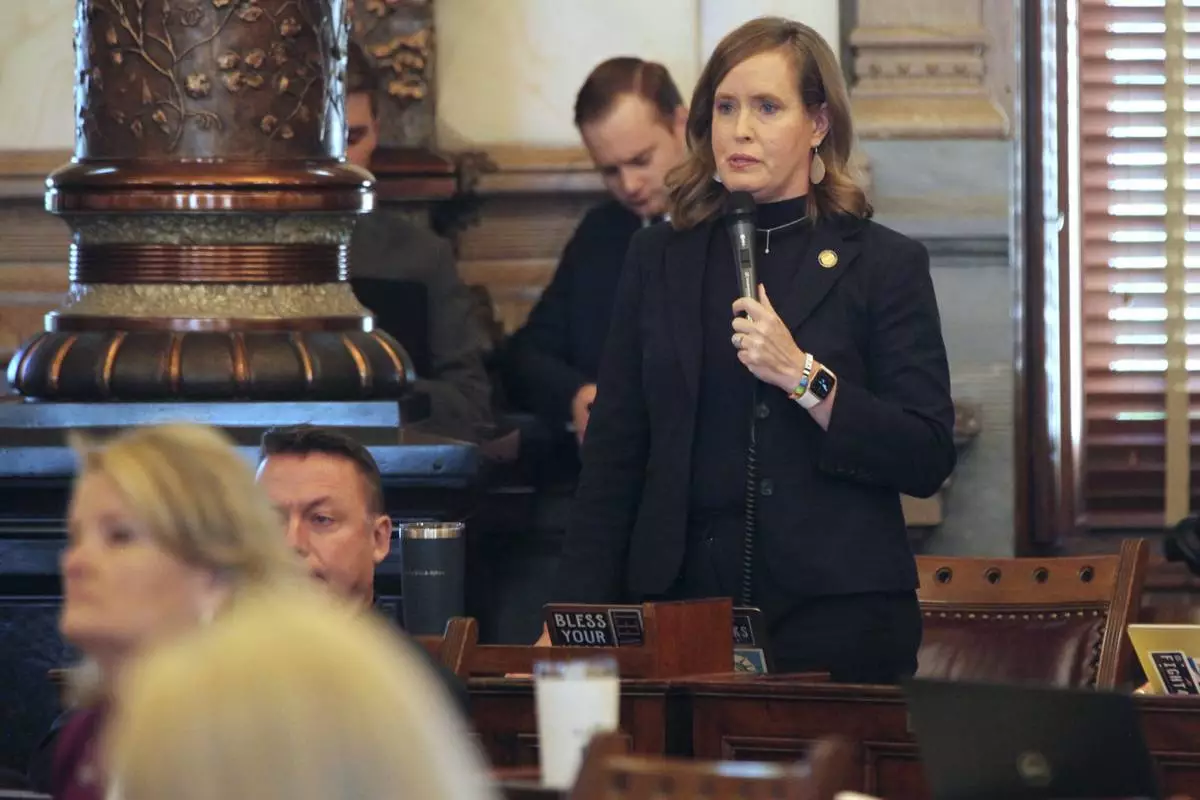
Kansas Senate Minority Leader Dinah Sykes, D-Lenexa, speaks against overriding Democratic Gov. Laura Kelly's veto of a proposed ban on gender-affirming care for minors. Sykes argues that the ban would deny transgender children crucial care that helps lessen severe depression and suicidal tendencies. (AP Photo/John Hanna)
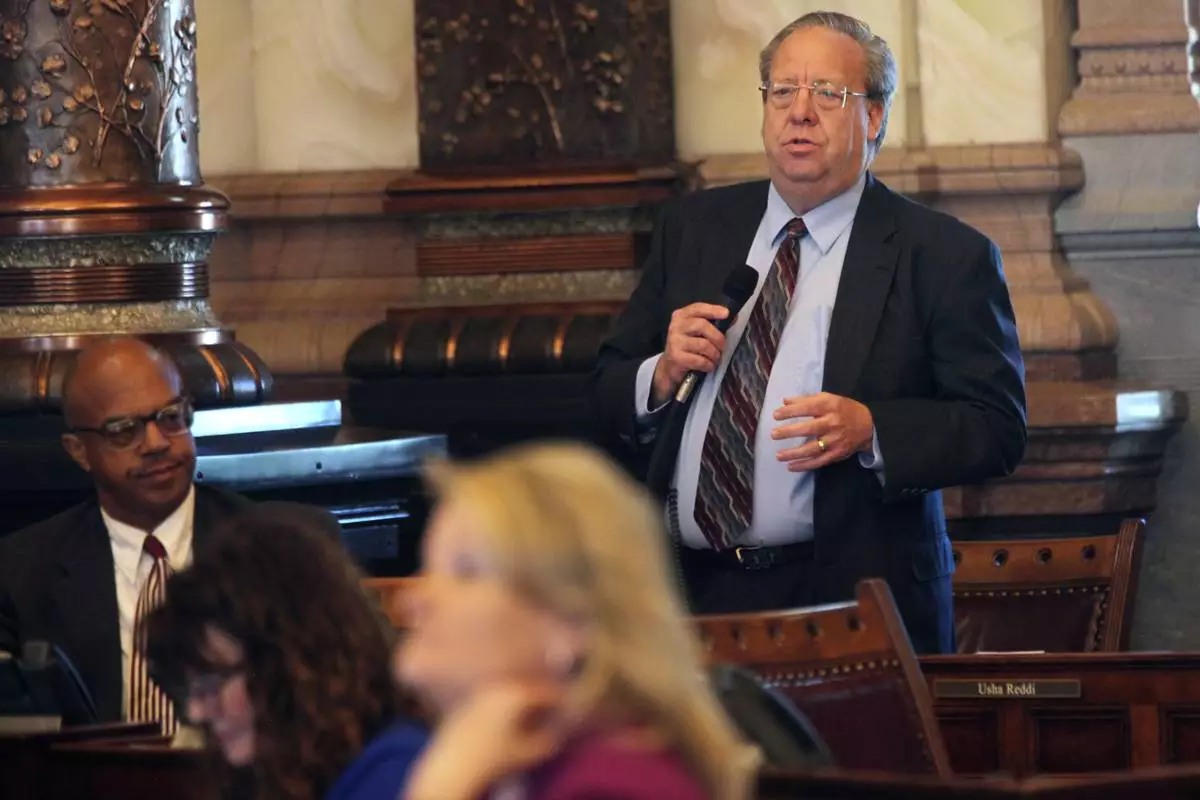
Kansas state Sen. Tom Holland, D-Baldwin City, speaks against overriding Democratic Gov. Laura Kelly's veto of a proposed ban on gender-affirming care for minors, Monday, April 29, 2024, at the Statehouse in Topeka, Kan. Holland suggested that the ban would send a message that Kansas is not welcoming. (AP Photo/John Hanna)

Lobbyists Brittany Jones, left, of the conservative group Kansas Family Voice, and Lucrecia Nold, right, of the Kansas Catholic Conference, watch from the Senate's west gallery as members debate overriding a proposed ban on gender-affirming care for minors, Monday, April 29, 2024, at the Statehouse in Topeka, Kan. Both of their organizations support a ban. (AP Photo/John Hanna)

Isaac Johnson, who just completed an internship with Topeka's public schools and is finishing work on a social work degree, talks to reporters during a news conference, Thursday, April 26, 2024, in front of a mural at the Statehouse in Topeka, Kan. Johnson, who is transgender, worries about the effects of a proposed ban on gender-affirming care for minors, which also would bar state employees from promoting social transitioning for youth. (AP Photo/John Hanna)
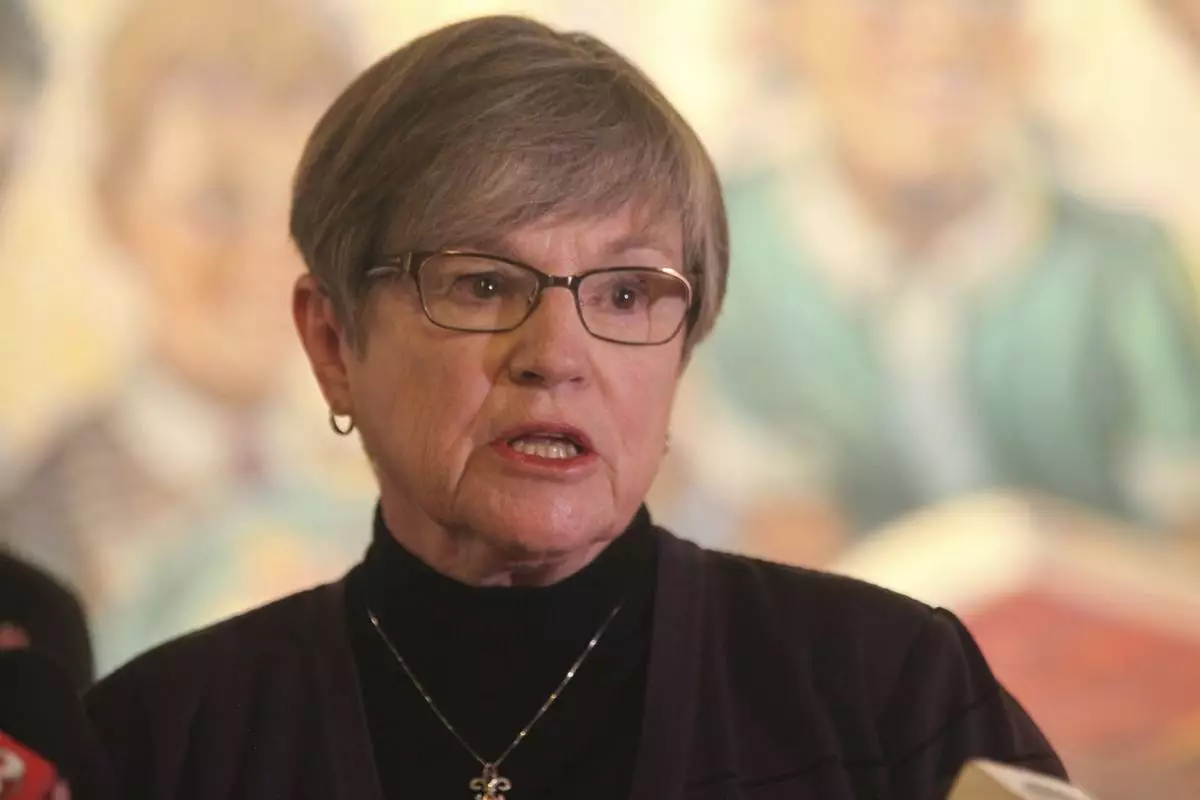
Kansas Gov. Laura Kelly speaks at a public event, Monday, April 29, 2024, at the Statehouse in Topeka, Kan. Kelly has vetoed a proposed ban on gender-affirming care for minors that also would bar state employees from advocating social transitioning for transgender children. (AP Photo/John Hanna)

Kansas state Sen. Mark Steffen, R-Hutchison, speaks in favor of overriding Democratic Gov. Laura Kelly's veto of a bill banning gender-affirming care for minors, Monday, April 29, 2024, at the Statehouse in Topeka, Kan. Steffen says the state must protect "confused" children from a "confused health care system and confused parents." (AP Photo/John Hanna)
















